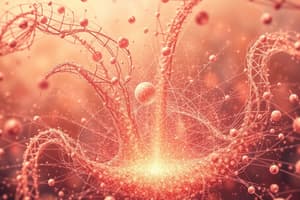Podcast
Questions and Answers
What does the kinetic theory state about all matter?
What does the kinetic theory state about all matter?
- All matter is stationary
- All matter is made of tiny particles that are always in motion (correct)
- All matter is invisible
- All matter is made of particles that move freely
What happens to the energy of particles in a substance when it is heated?
What happens to the energy of particles in a substance when it is heated?
- Energy of particles decreases
- Particles stop moving
- Energy of particles remains constant
- Energy of particles increases (correct)
In which state of matter do particles have the least energy according to the text?
In which state of matter do particles have the least energy according to the text?
- Plasmas
- Gases
- Liquids
- Solids (correct)
Which statement best describes the state of particles in a solid?
Which statement best describes the state of particles in a solid?
How do the particles in liquids and gases differ in terms of movement?
How do the particles in liquids and gases differ in terms of movement?
Particles in gases move freely at low speeds.
Particles in gases move freely at low speeds.
Particles in liquids do not move around freely.
Particles in liquids do not move around freely.
Heating an object decreases the energy of its particles.
Heating an object decreases the energy of its particles.
Particles in solids have more energy compared to particles in liquids.
Particles in solids have more energy compared to particles in liquids.
Particles in gases have less energy compared to particles in solids.
Particles in gases have less energy compared to particles in solids.
Flashcards are hidden until you start studying
Study Notes
States of Matter
- Matter is made up of tiny particles that are always in motion.
- These particles can move slowly or quickly.
Solids
- Particles in solids have less energy.
- Particles in solids do not move around freely, but are confined to a specific space within the container.
Liquids
- Particles in liquids have relatively more energy.
- Particles in liquids move freely within the container.
Gases
- Particles in gases have much more energy.
- Particles in gases move freely at high speeds.
Energy and Temperature
- Heating an object increases the energy of its particles.
- Cooling an object decreases the energy of its particles.
- Changes in the energy of particles result in changes in the movement of the object.
Studying That Suits You
Use AI to generate personalized quizzes and flashcards to suit your learning preferences.




